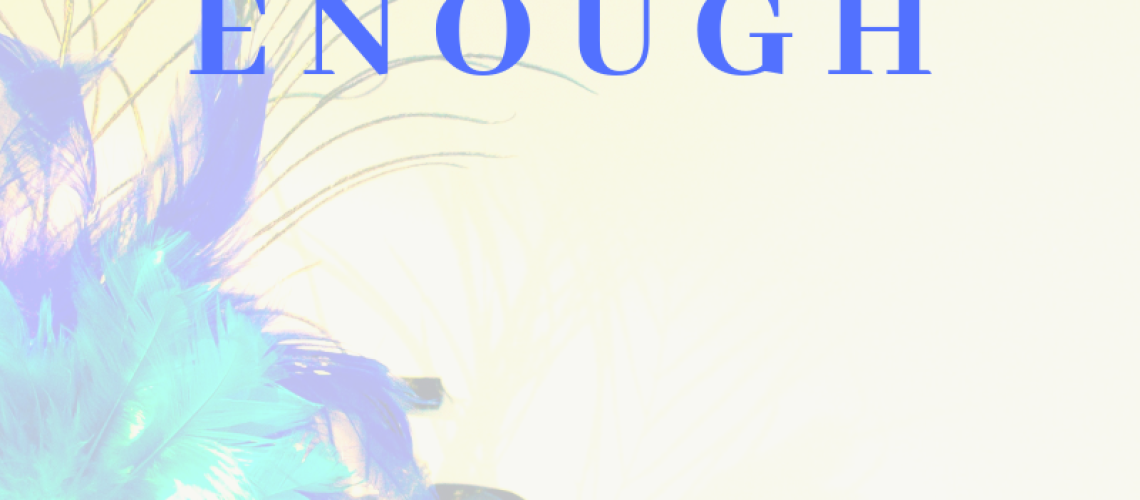From Imposter to Enough

Imposter to Enough
I’m in this place and I shouldn’t be. My hard work and drive should have another destiny. I worked so hard and don’t deserve this. I’m better off hiding my accomplishments.
I’m scared that I might not be so great. Finding out I’m fraudulent could be my fate. I don’t believe in what I can do. I’m my biggest naysayer, so I don’t need you.
I have to think differently and not beat myself up. I’m wonderfully made and I think I’m enough.
I am much more than I used to think so I’ll let my light can shine gloriously. I’m happy with me because I am enough. My light is so bright and I’ve got the right stuff.
Imposter Complex
I had the opportunity to present a workshop at Project Kinect‘s Social Change Conference in Madison, Wisconsin on the beautiful campus of Madison College on February 28, 2019. The theme of the conference was the Imposter Complex.
I never heard of the Imposter Complex prior to receiving the invitation to participate. I knew the definitions of imposter and complex, but I had no idea how they went together or why a social change conference would focus on such a theme.
The researcher in me read psychology publications, watched numerous YouTube Videos, and read numerous articles to understand imposter complex.
I soon found that many successful people experienced the imposter complex. My fellow Arkansan and favorite writer, Maya Angelou described her imposter complex by saying, “I have written eleven books, but each time I think, ‘uh oh, they’re going to find out now. I’ve run a game on everybody, and they’re going to find me out.” Despite her social change work, her successes, her awards, her commitment to writing, she still felt like she was a fraud.
After much research and learning about my favorite writer, I came up with a simple, one sentence definition to describe this complex, complex. Simply put, the imposter complex happens when a very successful, well-accomplished person feels like they are a fraud. This feeling happens despite hard work, educational attainment, professional training, job status, or even prestigious awards.
After researching, I understood why Project Kinect chose the theme. Many of us in the social change sector are very accomplished, hard-working people that never feel like our work is enough, our knowledge is too limited to do hard change work, and feelings of being fraudulent trump our successes.
I then began to consider what the imposter complex means for my own life as someone in the social change sector. The words “I AM ENOUGH” tapped on my consciousness. I began to understand, that when I embody and love everything that I am, I can’t help but acknowledge my enoughness.
I pondered on the question “what does ‘I am enough’ have to do with the imposter complex?” The answer was simple. We don’t have to feel like imposters or frauds when we understand that we are enough. We all have permission to show up anywhere, fully loving, capable, and experienced human beings, carrying all of our enoughness!
When the phase I am enough came to me, I further asked myself, “How am I enough?” I wrote a very formal answer and I was ok with that. However, the night before my scheduled workshop, I was awakened in the middle of the night with the poem “Imposter to Enough”, the poem I shared at the beginning of this post.
Additionally, that middle of the night experience revealed these words also. “I spend way too much time running from myself and my accomplishments. I should embrace my experiences and perspective because I am enough and my story matters. Additionally, joy comes from me being who I truly am instead of who I think I should be. Of all the people in the world, no one can be uniquely me, better than me. No one can be uniquely you, better than you. I should never have to shrink myself, hide from my greatness or disregard my perspectives because I feel I am not enough. I am enough because I am fearfully and wonderfully made. I am enough because I have a light and I have permission to let it shine without fear, but with total faith. “
These middle of the night revelations, just before the workshop, led me to change my previously planned workshop and instead focus on the question “How am I enough?” as a guiding question for our facilitated discussion.
“How am I enough?” is a question I’d never asked myself, and I soon found out that most of the attendees had never asked themselves this question either. After sharing the poem “Imposter to Enough” and sharing my own experiences with the imposter complex, I then posed the question.
The group discussions were intense, emotional, and for many people healing. I left the event sure that some of the attendees became more comfortable in their enoughness and they will take that comfort with them. I was excited because there were transformations for imposters to enough.
I challenge you to answer the question also, “How am I enough?” I hope your answer leads to greater self-discovery and feeling of gratitude for being enough.